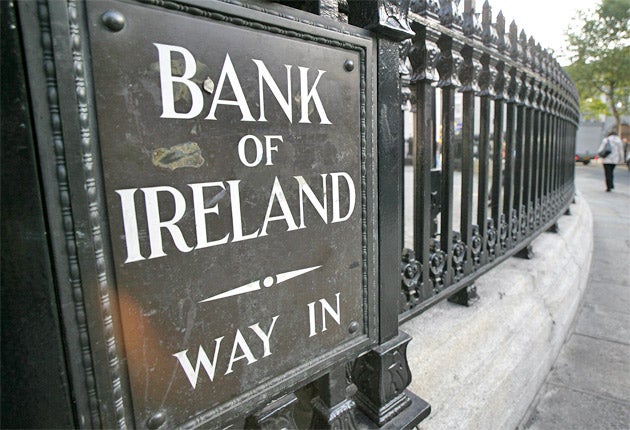Ireland's banks prepare for full nationalisation as crisis grows

Your support helps us to tell the story
From reproductive rights to climate change to Big Tech, The Independent is on the ground when the story is developing. Whether it's investigating the financials of Elon Musk's pro-Trump PAC or producing our latest documentary, 'The A Word', which shines a light on the American women fighting for reproductive rights, we know how important it is to parse out the facts from the messaging.
At such a critical moment in US history, we need reporters on the ground. Your donation allows us to keep sending journalists to speak to both sides of the story.
The Independent is trusted by Americans across the entire political spectrum. And unlike many other quality news outlets, we choose not to lock Americans out of our reporting and analysis with paywalls. We believe quality journalism should be available to everyone, paid for by those who can afford it.
Your support makes all the difference.Ireland was last night poised to nationalise its two biggest banks as the country continues to be battered by the financial crisis.
A source at one of the banks admitted that the situation was now "out of our hands" and resembled "what happened at Royal Bank of Scotland (RBS)" during the height of the global financial crisis in October 2008 when the British Government stepped in with a multi-billion pound bailout.
The Irish government is expected to take Allied Irish Banks, the weaker of the two, into full public ownership with Bank of Ireland set to have around 85 per cent of its shares held by the Irish government. At the end of the April, the finance minister Brian Lenihan described Bank of Ireland as "the first of our financial institutions to emerge from the banking crisis" following a £3bn capital raising from institutions.
Both banks also passed European-wide stress tests at the end of July conducted under the auspices of the Committee of European Banking Supervisors. The tests have been facing increasing criticism in recent months.
Yesterday a European Commission spokeswoman said the banks would face "severe" restructuring requirements linked to the country's bailout package."There will be a severe restructuring plan in place for Irish banks," the spokeswoman said. "There's nothing wrong with saving Irish banks, but it's going to be done using German, French, Italian money."
Any money advanced would be loans that would have to be returned. Shares in both banks swung wildly yesterday. Bank of Ireland would be the fifth financial institution to come under majority state control if the rescue package goes ahead. Investors were also spooked by suggestions by the Dutch finance minister that Irish bank bondholders should bear some of the pain of the financial rescue plan.
Bank of Ireland shares finished down 10 per cent after losing as much as 25 per cent earlier in the day. Allied Irish Banks closed flat.
So far, British banks have been seeking to reassure that the impact of the escalating crisis across the Irish Sea on them will be low, declaring only small exposure to Irish sovereign debt and Irish bank bonds. They have been backed by the City watchdog which on Tuesday sought to provide reassurances of its own.
The Financial Services Authority's chairman, Lord Turner, said the exposure of British banks to Irish sovereign debt and the Irish banking sector is small. Ian Gordon, an analyst at Exane BNP Paribas, said he remained far more concerned about the £52bn of Irish loans on RBS's books. Lloyds Banking Group has around half that and given the state of Ireland's economy, both banks are likely to take a severe hit – although Mr Gordon said it would take a situation close to financial Armageddon in Ireland to force RBS to increase its provisioning. That has not happened just yet.
However, analysts have been frustrated about the lack of hard data supplied by British banks. The Bank of International Settlements at the end of March put British banks' exposure to Ireland at about £36bn, far in excess of what banks have indicated.
As in Britain, where UK Financial Investments has been charged with overseeing and disposing of the British Government's interest in the banking sector, the Irish banks will eventually have to be re-privatised to help to repay the vast loans that will be extended.
City sources said they believed the main interest would come from private-equity players, seeing them as a potential recovery play when the problems have finally eased. Wilbur Ross, the billionaire investor, said his WL Ross & Co is one of two final bidders for EBS Building Society, another Irish bank.
In an interview he said his attempt to acquire the bank is "probably the strongest demonstration of our belief that Ireland will turn around and will come back out of this, perhaps not as the same Celtic Tiger that it had been, but as a good strong country". Irish Life & Permanent and a group led by Cardinal Capital are the final two bidders. The Cardinal group includes the Carlyle Group and WL Ross.
Join our commenting forum
Join thought-provoking conversations, follow other Independent readers and see their replies
Comments